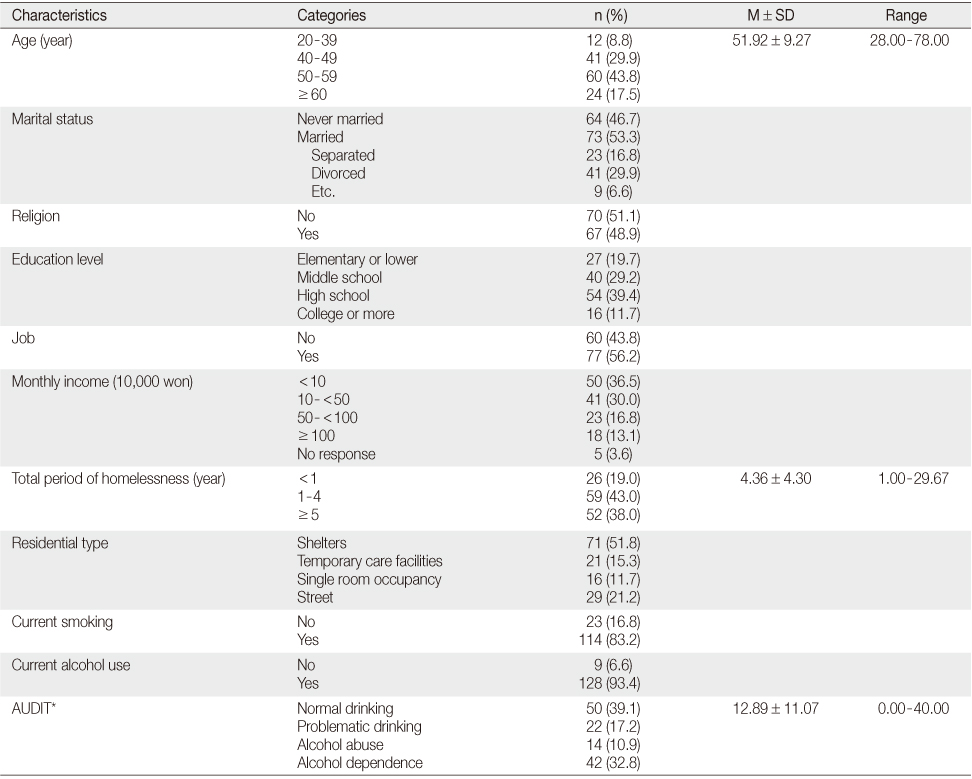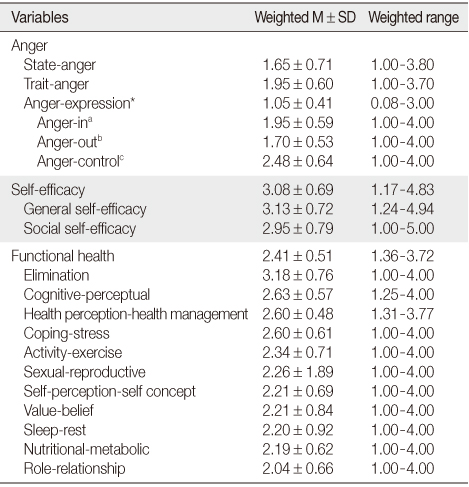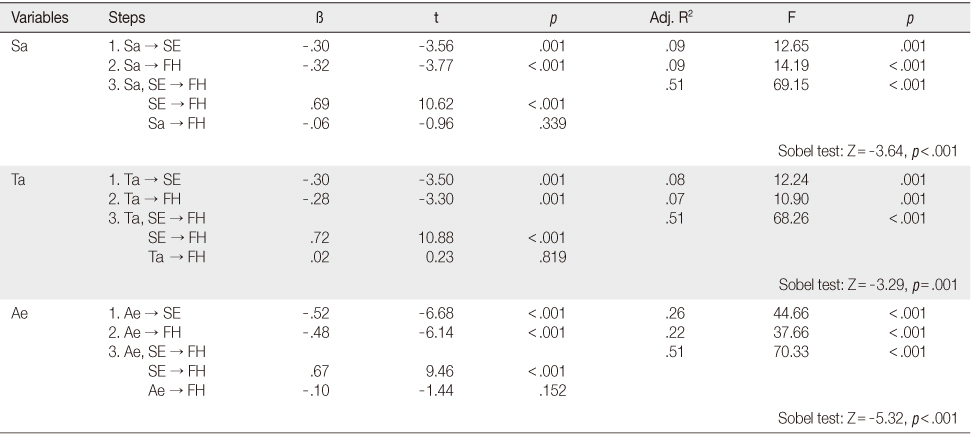Articles
- Page Path
- HOME > J Korean Acad Nurs > Volume 44(4); 2014 > Article
-
Original Article
- Mediating Effect of Self-efficacy in the Relationship between Anger and Functional Health of Homeless Men
- Su In Park, Sunah Kim
-
Journal of Korean Academy of Nursing 2014;44(4):361-370.
DOI: https://doi.org/10.4040/jkan.2014.44.4.361
Published online: August 29, 2014
1Nursing Policy Research Institute, College of Nursing, Yonsei University, Seoul, Korea.
2College of Nursing, Yonsei University; Nursing Policy Research Institute, College of Nursing, Yonsei University, Seoul, Korea.
- Address reprint requests to: Kim, Sunah. College of Nursing, Yonsei University, 50 Yonsei-ro, Seodaemun-gu, Seoul 120-752, Korea. Tel: +82-2-2228-3275, Fax: +82-2-364-5027, psy0962@yuhs.ac
© 2014 Korean Society of Nursing Science
This is an Open Access article distributed under the terms of the Creative Commons Attribution NoDerivs License. (http://creativecommons.org/licenses/by-nd/4.0/) If the original work is properly cited and retained without any modification or reproduction, it can be used and re-distributed in any format and medium.
Abstract
-
Purpose
- The purpose of this study was to examine the mediation of self-efficacy in the relationship between anger and the functional health of homeless men in order to provide a basis for planning nursing interventions to improve the functional health of homeless persons.
-
Methods
- The participants were 137 homeless men who lived in homeless shelters or visited one center serving free meals for homeless persons in Seoul. Data were collected using self-report questionnaires and analyzed with the SPSS-WIN 20.0 program. The instruments were the Functional Health Pattern Screening Assessment Tool (FHPAST), Self-efficacy Scale (SES), and State-trait Anger Expression Inventory-Korean version (STAXI-K).
-
Results
- The mean score for functional health was 2.41. Overall self-efficacy was 70.82. state anger was 16.53, trait anger was 19.54, and anger expression was 25.31. There were signigicant correlations among the 3 variables, functional health, self-efficacy, and anger. Also, self-efficacy had a complete mediating effect in the relationship between anger and functional health.
-
Conclusion
- Based on the findings of this study, health management programs focusing on anger management and self-efficacy improvement are highly recommended to promote functional health in homeless persons.
- 1. Ministry of Health & Welfare. Welfare projects of the homeless in 2013. Seoul: Author; 2013.
- 2. Park YC. Homelessness issues and policy challenges in Seoul city government. Law Adm Rev. 2001;8:311–339.
- 3. Nyamathi A. Developing nursing theory and science in vulnerable populations research. In: The 9th International Nursing Conference & 3rd World Academy of Nursing Science; 2013 October 16-18; The-K Seoul Hotel. Seoul, Korean Society of Nursing Science; 2013. p. 56–60.
- 4. Crawley J, Kane D, Atkinson-Plato L, Hamilton M, Dobson K, Watson J. Needs of the hidden homeless-no longer hidden: A pilot study. Public Health. 2013;127(7):674–680. http://dx.doi.org/10.1016/j.puhe.2013.04.006ArticlePubMed
- 5. Ram U. Roots of anger and aggression: Indian wisdom from the Bhagawad Gita. Korean J Health Psychol. 2000;5(2):171–180.
- 6. Evans S, Giosan C, Patt I, Spielman L, Difede J. Anger and its association to distress and social/occupational functioning in symptomatic disaster relief workers responding to the September 11, 2001, World Trade Center disaster. J Trauma Stress. 2006;19(1):147–152. http://dx.doi.org/10.1002/jts.20107ArticlePubMed
- 7. Smith TW, Glazer K, Ruiz JM, Gallo LC. Hostility, anger, aggressiveness, and coronary heart disease: An interpersonal perspective on personality, emotion, and health. J Pers. 2004;72(6):1217–1270. http://dx.doi.org/10.1111/j.1467-6494.2004.00296.xArticlePubMed
- 8. Spielberger CD. Professional manual for the state-trait anger expression inventory-2 (STAXI-2). Odessa, FL: Psychological Assessment Resources; 1988.
- 9. Kim KH, Chon KK. Effects of anger, hostility, and stress on physical health. Korean J Health Psychol. 1997;2(1):79–95.
- 10. Williams JE, Nieto FJ, Sanford CP, Couper DJ, Tyroler HA. The association between trait anger and incident stroke risk: The atherosclerosis risk in communities (ARIC) study. Stroke. 2002;33(1):13–19.ArticlePubMed
- 11. Pender N, Murdaugh CL, Parsons MA. Health promotion in nursing practice. 6th ed. Upper Saddle River, NJ: Pearson/Prentice-Hall; 2010.
- 12. Oh H, Jeong H, Seo W. Integrative smoking cessation stage model for Chinese students studying in Korea. Asian Nurs Res. 2013;7(4):182–190.Article
- 13. Bandura A. Self-efficacy: The exercise of control. New York, NY: Worth Publishers; 1997.
- 14. Yoo H, Kim CJ, Jang Y, You MA. Self-efficacy associated with self-management behaviours and health status of South Koreans with chronic diseases. Int J Nurs Pract. 2011;17(6):599–606. http://dx.doi.org/10.1111/j.1440-172X.2011.01970.xArticlePubMed
- 15. Yeom HE. Association among ageing-related stereotypic beliefs, self-efficacy and health-promoting behaviors in elderly Korean adults. J Clin Nurs. 2014;23(9-10):1365–1373. http://dx.doi.org/10.1111/jocn.12419PubMed
- 16. Han JY. The effects of anger expression mode of high school student on depression and self-efficacy [master's thesis]. Seoul, Hankuk University of Foreign Studies. 2007.
- 17. Park HS, Koo HY. A study of anger and health status in middle aged women. J Korean Acad Psychiatr Ment Health Nurs. 2004;13(3):245–256.ArticlePDF
- 18. Faul F, Erdfelder E, Buchner A, Lang AG. Statistical power analyses using G*Power 3.1: Tests for correlation and regression analyses. Behav Res Methods. 2009;41(4):1149–1160. http://dx.doi.org/10.3758/brm.41.4.1149ArticlePubMedPDF
- 19. Chon KK, Hahn DW, Lee CH. Korean adaptation of the state-trait anger expression inventory (STAXI-K): The case of college students. Korean J Health Psychol. 1998;3(1):18–32.
- 20. Sherer M, Maddux JE, Mercandante B, Prentice-dunn S, Jacobs B, Rogers RW. The self-efficacy scale: Construction and validation. Psychol Rep. 1982;51(2):663–671. http://dx.doi.org/10.2466/pr0.1982.51.2.663ArticlePDF
- 21. Hong HY. The relationship of perfectionism, self-efficacy and depression [master's thesis]. Seoul: Ewha Womans University; 1995.
- 22. Jones D. Establishing the psychometric properties of the FHPAST: Use in practice. J Jpn Soc Nurs Diagn. 2002;7(1):12–17.
- 23. Keum R, Kim S. Perceived functional health patterns and recovery in people with schizophrenia spectrum disorders. J Korean Acad Psychiatr Ment Health Nurs. 2012;21(3):238–249. http://dx.doi.org/10.12934/jkpmhn.2012.21.3.238Article
- 24. Baron RM, Kenny DA. The moderator-mediator variable distinction in social psychological research: Conceptual, strategic, and statistical considerations. J Pers Soc Psychol. 1986;51(6):1173–1182.ArticlePubMed
- 25. Ministry of Health & Welfare, Korean Centers for Disease Control & Prevention. Korea national health and nutrition examination survey, 2011. Seoul: Ministry of Health & Welfare; 2012.
- 26. Hwang RI, Yoon JW. The predictors of anger expression of the homeless in the shelters. J Korean Acad Community Health Nurs. 2011;22(1):22–32. http://dx.doi.org/10.12799/jkachn.2011.22.1.22Article
- 27. Park YJ, Baik S, Shin HJ, Yoon JW, Chun SH, Moon S. Anger, cardiovascular health and depression in middle-aged Korean men: The mediating effect of social support. J Korean Acad Nurs. 2006;36(5):863–871.ArticlePDF
- 28. Kim S, Kim SY. A study on aging anxiety and self-efficacy of middle aged adults. J Korean Acad Psychiatr Ment Health Nurs. 2008;17(3):281–291.ArticlePDF
- 29. Tollett JH, Thomas SP. A theory-based nursing intervention to instill hope in homeless veterans. ANS Adv Nurs Sci. 1995;18(2):76–90.ArticlePubMed
- 30. Epel ES, Bandura A, Zimbardo PG. Escaping homelessness: The influences of self-efficacy and time perspective on coping with homelessness. J Appl Soc Psychol. 2006;29(3):575–596. http://dx.doi.org/10.1111/j.1559-1816.1999.tb01402.x
REFERENCES
Figure & Data
REFERENCES
Citations

- Factors influencing satisfaction with medical services in medically underserved populations: an analytical cross-sectional study at a free medical clinic in the Republic of Korea
Joo Hyun Kim, Yeon Jeong Heo, Jae Bok Kwak, Samil Park, Curie Ahn, So Hee Ahn, Bumjo Oh, Jung Sik Lee, Jun Hyun Lee, Ho Young Lee
Osong Public Health and Research Perspectives.2025; 16(2): 181. CrossRef - The Urban Poor Patients’ Experience of Visiting a Free Clinic
Joo Hyun Kim, Yeon Jeong Heo, Jae Bok Kwak, So Hee Ahn, Bumjo Oh, Jung Sik Lee, Ho-Young Lee
Journal of Korean Association for Qualitative Research.2023; 8(2): 137. CrossRef - Association between post‐traumatic stress symptoms and functional health among internally displaced people in Myanmar
Go‐Un Kim, Eunyoung Jung, Mi‐So Shim, Gwang Suk Kim
Journal of Psychiatric and Mental Health Nursing.2022; 29(4): 555. CrossRef - Factors Influencing Functional Health of Patients with Chronic Insomnia based on Theory of Unpleasant Symptoms
Eun Kyoung Han, Sunah Kim, In-Young Yoon
Korean Journal of Adult Nursing.2019; 31(2): 165. CrossRef - A Phenomenology Study of the Lived Experience of Homeless Persons
Jin Ju Kim, Eunyoung Park, Myungsun Hyun
Journal of Korean Academy of Psychiatric and Mental Health Nursing.2017; 26(1): 88. CrossRef - Comparing anger, anger expression, life stress and social support between Korean female nursing and general university students
Won Hee Jun, Gyungjoo Lee
Journal of Advanced Nursing.2017; 73(12): 2914. CrossRef - Anger expression, self‐efficacy and interpersonal competency of Korean nursing students
W.‐H. Jun
International Nursing Review.2016; 63(4): 539. CrossRef - Mediating Effect of Self-Efficacy in the Relationship between Internalized Stigma and Treatment Adherence of Community Dwelling Patients with Mental Illness
Jin Hee Kim, Hyunjoo Na
Journal of Korean Academy of Psychiatric and Mental Health Nursing.2016; 25(1): 11. CrossRef - Trait Anger, Anger Expression, Positive Thinking and Gratitude in College Students
Won-Hee Jun
Journal of Korean Academy of Psychiatric and Mental Health Nursing.2016; 25(1): 28. CrossRef
General Characteristics of Participants (N=137)
*Except for non-drinkers; AUDIT=Alcohol use disorders identification test.
Level of Anger, Self-efficacy, and Functional Health (N=137)
*(a+b-c)+16.
Relationships among Anger, Self-efficacy, and Functional Health (N=137)
Mediating Effect of Self-efficacy in the Relationship between Anger and Functional Health (N=137)
Sa=State anger; Ta=Trait anger; Ae=Anger expression; SE=Self-efficacy; FH=Functional health.
*Except for non-drinkers; AUDIT=Alcohol use disorders identification test.
*(a+b-c)+16.
Sa=State anger; Ta=Trait anger; Ae=Anger expression; SE=Self-efficacy; FH=Functional health.
 KSNS
KSNS
 E-SUBMISSION
E-SUBMISSION




 Cite
Cite

